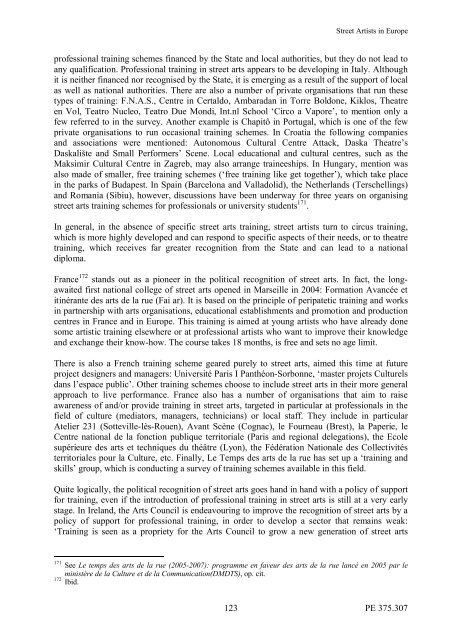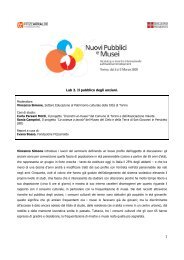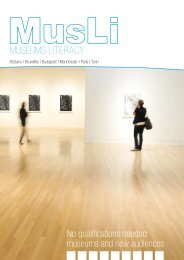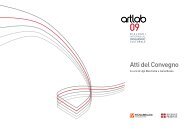STREET ARTISTS IN EUROPE - Fondazione Fitzcarraldo
STREET ARTISTS IN EUROPE - Fondazione Fitzcarraldo
STREET ARTISTS IN EUROPE - Fondazione Fitzcarraldo
Create successful ePaper yourself
Turn your PDF publications into a flip-book with our unique Google optimized e-Paper software.
Street Artists in Europe<br />
professional training schemes financed by the State and local authorities, but they do not lead to<br />
any qualification. Professional training in street arts appears to be developing in Italy. Although<br />
it is neither financed nor recognised by the State, it is emerging as a result of the support of local<br />
as well as national authorities. There are also a number of private organisations that run these<br />
types of training: F.N.A.S., Centre in Certaldo, Ambaradan in Torre Boldone, Kiklos, Theatre<br />
en Vol, Teatro Nucleo, Teatro Due Mondi, Int.nl School ‘Circo a Vapore’, to mention only a<br />
few referred to in the survey. Another example is Chapitô in Portugal, which is one of the few<br />
private organisations to run occasional training schemes. In Croatia the following companies<br />
and associations were mentioned: Autonomous Cultural Centre Attack, Daska Theatre’s<br />
Daskalište and Small Performers’ Scene. Local educational and cultural centres, such as the<br />
Maksimir Cultural Centre in Zagreb, may also arrange traineeships. In Hungary, mention was<br />
also made of smaller, free training schemes (‘free training like get together’), which take place<br />
in the parks of Budapest. In Spain (Barcelona and Valladolid), the Netherlands (Terschellings)<br />
and Romania (Sibiu), however, discussions have been underway for three years on organising<br />
street arts training schemes for professionals or university students 171 .<br />
In general, in the absence of specific street arts training, street artists turn to circus training,<br />
which is more highly developed and can respond to specific aspects of their needs, or to theatre<br />
training, which receives far greater recognition from the State and can lead to a national<br />
diploma.<br />
France 172 stands out as a pioneer in the political recognition of street arts. In fact, the longawaited<br />
first national college of street arts opened in Marseille in 2004: Formation Avancée et<br />
itinérante des arts de la rue (Fai ar). It is based on the principle of peripatetic training and works<br />
in partnership with arts organisations, educational establishments and promotion and production<br />
centres in France and in Europe. This training is aimed at young artists who have already done<br />
some artistic training elsewhere or at professional artists who want to improve their knowledge<br />
and exchange their know-how. The course takes 18 months, is free and sets no age limit.<br />
There is also a French training scheme geared purely to street arts, aimed this time at future<br />
project designers and managers: Université Paris I Panthéon-Sorbonne, ‘master projets Culturels<br />
dans l’espace public’. Other training schemes choose to include street arts in their more general<br />
approach to live performance. France also has a number of organisations that aim to raise<br />
awareness of and/or provide training in street arts, targeted in particular at professionals in the<br />
field of culture (mediators, managers, technicians) or local staff. They include in particular<br />
Atelier 231 (Sotteville-lès-Rouen), Avant Scène (Cognac), le Fourneau (Brest), la Paperie, le<br />
Centre national de la fonction publique territoriale (Paris and regional delegations), the Ecole<br />
supérieure des arts et techniques du théâtre (Lyon), the Fédération Nationale des Collectivités<br />
territoriales pour la Culture, etc. Finally, Le Temps des arts de la rue has set up a ‘training and<br />
skills’ group, which is conducting a survey of training schemes available in this field.<br />
Quite logically, the political recognition of street arts goes hand in hand with a policy of support<br />
for training, even if the introduction of professional training in street arts is still at a very early<br />
stage. In Ireland, the Arts Council is endeavouring to improve the recognition of street arts by a<br />
policy of support for professional training, in order to develop a sector that remains weak:<br />
‘Training is seen as a propriety for the Arts Council to grow a new generation of street arts<br />
171 See Le temps des arts de la rue (2005-2007): programme en faveur des arts de la rue lancé en 2005 par le<br />
ministère de la Culture et de la Communication(DMDTS), op. cit.<br />
172 Ibid.<br />
123<br />
PE 375.307






